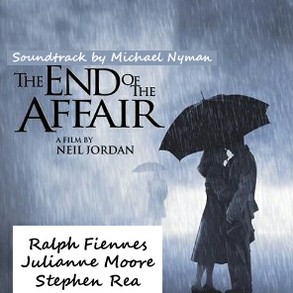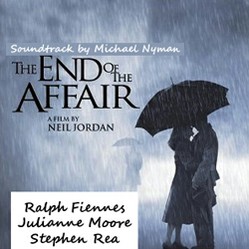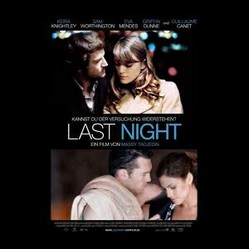Simple words gain so much power in this movie. I don't know about Graham Greene's book, but I kept writing down quotes, some of which seem benign ("You see, Bendrix, never make a promise. You may have to keep it.") but which in the context of the film were extremely powerful. The way the director, scriptwriter and actors controlled emotion while also making a very strong emotional impact is brilliant. Ralph Fiennes was better than ever. His acting extended to vague expressions on his thin lips and the waters of his eyes - OK, I'm exaggerating a bit, but you don't see that kind of subtle acting very often. Fabulous! Julianne Moore was also very good, and Stephen Rea, who played Henry, did a great job as well.
The End of the Affair is about two lovers, Bendrix and Sarah, during WWII in London. Henry is Sarah's by-standing husband. Bendrix and Sarah have a passionate affair and then Sarah pulls back. Bendrix wants her back. Sarah thinks he'll always have her heart. For more, see the film.
The End of the Affair (1999) was directed by Neil Jordan. Michael Nyman wrote the music. I feel this movie is a bit of everything: Hollywood production, European film, and art film.











 Funny T-Shirts and Mugs for the First Year of the Covid Eraon 10/15/2020
Funny T-Shirts and Mugs for the First Year of the Covid Eraon 10/15/2020
 Cool Gadgets for Geeks and Travelers Part 3, Great Gifts This Christmason 05/06/2019
Cool Gadgets for Geeks and Travelers Part 3, Great Gifts This Christmason 05/06/2019
 25 Creative Get Well Gift Ideas for Coworkerson 03/08/2019
25 Creative Get Well Gift Ideas for Coworkerson 03/08/2019
 Perfect the Moment. Seize the Day and Perfect Iton 12/12/2018
Perfect the Moment. Seize the Day and Perfect Iton 12/12/2018



Comments
I really liked The Quiet American, the version with Michael Caine. Will have to see the other one as well. And yes, The End of the Affair too.
Mira, Nice review! "The Quiet American" is the book that I go back to in Graham Green's literary output. Both the older and the recent versions of "The End of the Affair" and "The Quiet American" merit purchase, viewing and re-viewing even though I particularly like Audie Murphy's and Sir Michael Redgrave's interpretations of their roles.
:)
Yes, there's a lot of good stuff out there :). Thank you, Emma, for stopping by. I enjoy your visits :-)
Thanks, Emma! I try :)
I now have the book The End of the Affair, too. Thanks for reminding me that I wanted to read it :)
Oh, this is another one of my all-time favorites. And the storyline is so simple, I don't even know what it is about this movie that grips the soul. Well, I know actually, it's Graham Greene. I imagine the book must be marvelous. I'll have to read it soon.
This sounds like a well developed movie with a great story line. Looking forward to it, putting it on my movies to watch list. :)K